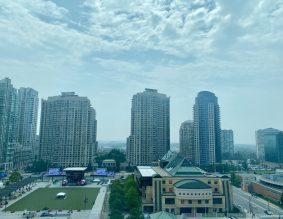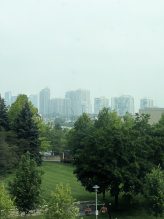Wildfire smoke could worsen Mississauga’s air quality
Although the risk of wildfires occurring directly within Mississauga remains low, the broader implications of smoke impacts is becoming increasingly concerning.
Environment | June 5, 2024
Wildfire season has begun in Canada. According to the Canadian Interagency Forest Fire Centre, there are more than 130 wildfires currently burning across the country. The thick, dense smoke billowing from the wildfires is blowing long distances, into other provinces and states in the US, affecting air quality levels. While the risk of wildfires occurring directly within Mississauga remains low, the broader implications of smoke impacts is becoming increasingly concerning. It’s a stark reminder about the climate change crisis we are facing.

In some western Canada communities, residents have already been encouraged to evacuate, as wildfires are spreading rapidly and smoke is cover . Wildfire smoke is different from common air pollution. Fine particulate matter along with gases like carbon monoxide can be inhaled and lead to inflammation that affects other parts of your body. While wildfire season has only just begun, many villages, towns and cities are already grappling with poor air quality conditions, some the worst they have ever experienced.
Many Canadian cities and regions use two resources issued by Environment & Climate Change Canada (ECCC) to monitor air quality – the Air Quality Health Index (AQHI) and Special Air Quality Statements (SAQS). When special air quality advisories and statements are in effect and alert the public when there is low air quality via social media. On the advice of Peel Public Health, outdoor programs and services may be cancelled or postponed to avoid exposure of poor air quality.
Exposure to air pollution
Reducing exposure to air pollution including wildfire smoke is the best way to protect your health. Wildfire smoke contains pollutants, poses a threat to public health, and can trigger symptoms ranging from eye irritation to severe respiratory distress. Common symptoms of being exposed to wildfire smoke for a prolonged period of time include irritation, sore throat, cough, headache and difficulty breathing. Anyone who has severe symptoms such as difficulty breathing, catching their breath or heart palpitations should seek medical attention immediately.
Vulnerable groups including seniors, pregnant individuals, infants, young children, and those with pre-existing heart and lung conditions are particularly at risk. People participating in strenuous outdoor activities are also at a heightened risk of adverse health effects due to prolonged exposure to polluted air – so proper caution and care should be taken.
Protecting yourself from wildfire smoke
Consider taking the following actions to protect your health during wildfire smoke events that lead to poor air quality:
- Assess your own sensitivity to air pollution.
- Download the WeatherCan app to be notified about air quality advisories and alerts.
- Prepare for smoke and air quality events by monitoring the AQHI or signing up to be alerted by email.
- When possible, stay indoors and reduce strenuous outside activities, especially high-intensity exercise or workouts until air quality improves.
- If at any point you feel unwell, reduce your exposure immediately.
- Consider reducing the intensity of outdoor activities or rescheduling them.
- Check in on loved ones, neighbours and friends, especially the elderly.
- For those working outdoors, where possible, avoid strenuous activities and take breaks indoors.
- Keep windows and doors closed and try to keep cool indoors.
- Set your heating, ventilation and air conditioning (HVAC) system to recirculate when the outdoor air is poor, and bring in fresh air when the outdoor air has improved.
- Limit the use of kitchen and bathroom fans. Negative air pressure created by these ventilation systems will draw in wildfire smoke.
- Consider purchasing an air purifier to clean the air in your home.
- If you need a place to go, public spaces like the City’s libraries and community centres are open for those who need a break from the outdoors. Shopping malls and movie theatres often have large filtration systems and are relatively good for indoor air quality as well.
- Make sure to stay well hydrated to help remove toxins from both your kidneys and liver which can help reduce inflammation caused by being exposed to wildfire smoke.
- For at-risk individuals and those who are unhoused in our community, there are immediate support services and resources available. You can also temporarily relocate to a library or community centre.
Open air burning
Open air burning is allowed in Mississauga, but you may need an open-air burn permit. If Mississauga is experiencing low air quality, residents will be asked to limit open air burning activities. In some cases where air quality is being affected by wildfire smoke, the City may suspend issuing open air burn permits to further reduce smoke that might worsen the compromised Air Quality Health Index levels.
Emergency preparedness
When it comes to being prepared for emergencies, we all have a part to play. The City is encouraging residents to always be prepared. Read the following tips on the best way you can be prepared in case of an emergency.
Wildfires and climate change
Climate change is shifting our temperatures and causing more extreme weather events. This situation underscores the urgent need for action and adaptation strategies to address the wider environmental challenges that contribute to these increasingly frequent and severe wildfires.
In 2023, Mississauga saw warm weather in the spring, a hotter summer affected by wildfire smoke, milder than average temperatures in the fall and a warmer start to winter with minimal snow.
Environment and Climate Change Canada predicts a 50 to 60 per cent chance of above-normal temperatures from January through March 2025. Every degree of temperature change, even one degree warmer, can impact our environment significantly. This could mean more flooding, wildfires or intense heat waves. Temperatures are trending warmer across all seasons. The City’s climate projections indicate that the average annual temperature in Mississauga is expected to increase by 3.4 degrees Celsius in the 2050s and 5.7 degrees Celsius in the 2080s.
The Intergovernmental Panel on Climate Change (IPCC), the United Nations body for assessing the science related to climate change, reports that climate change is making weather conditions more favourable for wildfires to spread faster and further. Overtime, this happens because extreme heat dries out the soil and plants, making them very dry and easier to catch fire. These conditions help fires grow quickly, especially with strong winds.
As climate change continues, the frequency and intensity of wildfires across Canada will also continue. While the risk of this occurring in Mississauga is low, wildfires can contribute significantly to lower air quality and air pollution, affecting the health of millions of people.
As a City, we are adopting proactive measures, including better forest management, community preparedness, and plans aimed at mitigating climate change, to reduce the occurrence and impact of these destructive events in our community.
Learn more about the City’s Climate Change Action Plan and the actions the City is taking to help fight climate change.
Tags
Media contact
City of Mississauga Media Relations
media@mississauga.ca
905-615-3200, ext. 5232
TTY: 905-896-5151
